When you think about the future of marketing, what comes to mind? For many digital marketers, 2025 means a time when consumers have become more savvy and demanding than ever before! We expect increased engagement in online short video content, AI-driven bots, and chatbots that can answer questions on demand.
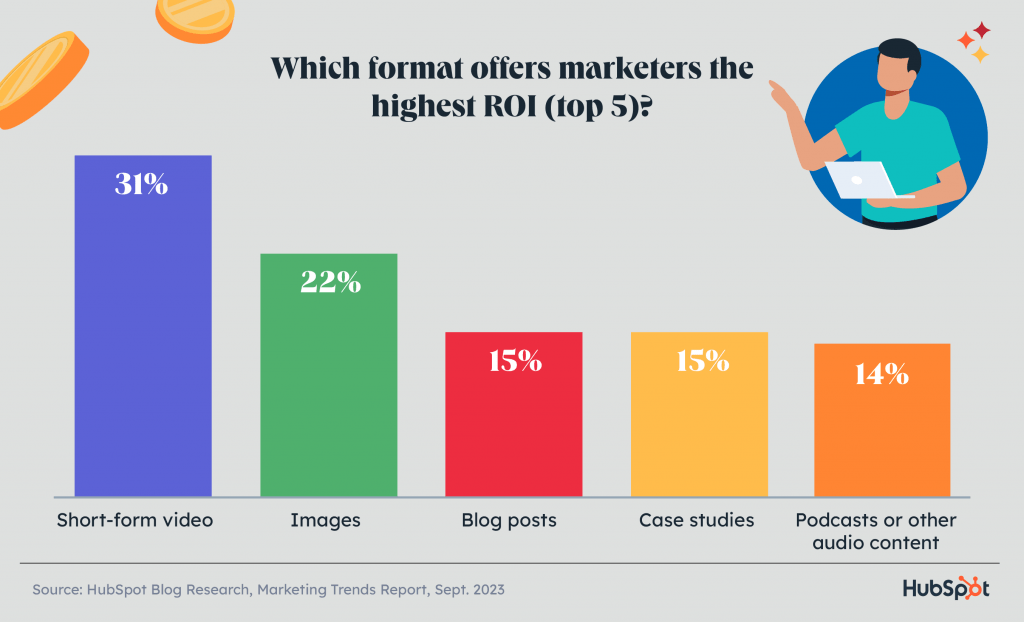
There will be new technology in place to help us reach people more effectively than ever before. The question is: how do we make sure those tools are being used to their fullest potential? In this article, we will try to answer this question while also looking at other emerging trends like short-form video content and real-time marketing, as well as some established ones like personalization and data-driven creative decisions.
This year, marketers like you and me are witnessing something exceptional. Now cutting-edge technologies like AI and innovative strategies are reshaping how we connect with our audiences. Imagine a world where AI-driven bots and chatbots are not just tools, but partners in crafting compelling narratives. These narratives resonate with consumers who are more informed than ever.
Also have a look at Most Reliable Top 10 Best Digital Marketing Companies
Let’s look at the rising trends and predictions for Digital Marketing in 2025.
- 1. AI Will be the Backbone of Marketing Strategy
- 2. The Video Marketing Will be at It’s Peak
- 3. Content Marketing and SEO Trends
- 4. Automation and Efficiency in Marketing
- 5. Real-Time Marketing
- 6. Shift in Consumer Behavior and Expectations
- 7. Diverse Content Creators
- 8. Data Analytics and Hyper-Personalization
- 9. Voice Search & Conversational Commerce Takes Off
- 10. Privacy-First Marketing & Zero-Party Data
- 11. Sustainability & Ethical Storytelling Drive Purchase Intent
- 12. Social Commerce & In-App Checkout Eclipse Traditional Funnels
- 13. Augmented Reality (AR) & Virtual Try-Ons Become Table Stakes
- Final Words
1. AI Will be the Backbone of Marketing Strategy
In 2025, AI has become the backbone of digital marketing strategies. Several trends and statistics highlight its growing importance and impact:
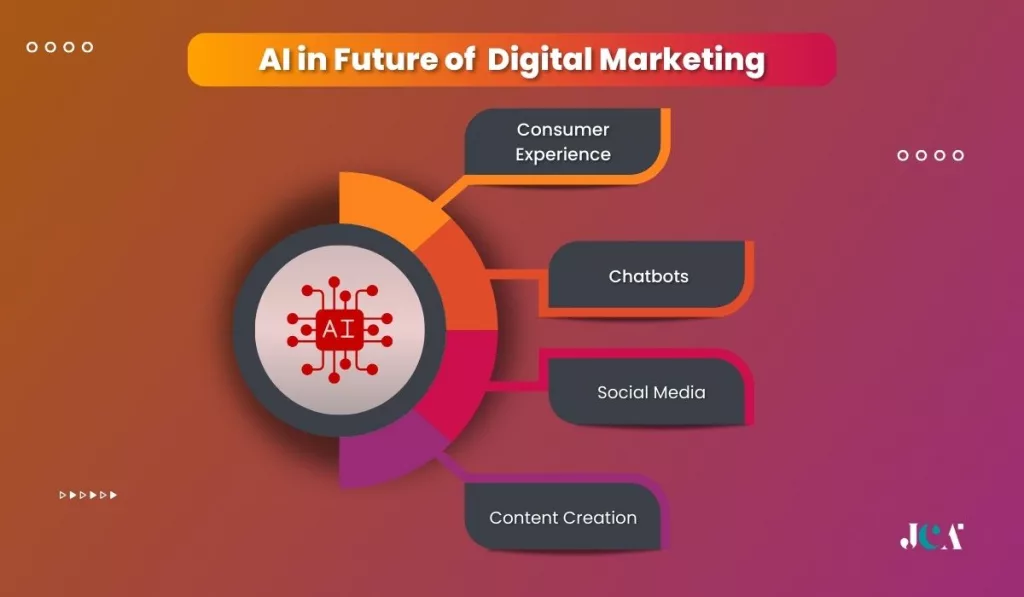
Adoption and Growth of AI in Marketing
AI adoption in digital marketing has seen substantial growth. The market size in the Artificial Intelligence market is projected to reach US$305.90bn in 2025. The market size is expected to show an annual growth rate (CAGR 2025-2030) of 15.83%, resulting in a market volume of US$738.80bn by 2030. This growth is driven by the increasing demand for personalized experiences and automated customer segmentation, crucial in today’s marketing landscape.
AI’s Role in Enhancing Marketing Strategies
AI-powered tools, such as content optimization and search engine algorithms, are significantly improving website performance and ROI. AI-driven marketing strategies are now essential tools for modern digital marketing initiatives.
AI and Customer Experience
Utilizing AI in marketing can yield substantial returns, including a fivefold return on investment, by enhancing customer experience. As many as 70% of marketers believe AI will revolutionize targeting customers with relevant messages.
Statistics on AI in Social Media and Chatbots
AI is significantly impacting social media marketing. For example, Facebook experienced a 15% increase in Reels watch time due to AI recommendations. Chatbots, too, are becoming a mainstream tool in digital marketing, with significant impacts on customer education and lead generation.
Consumer Attitudes and AI’s Future in Marketing
AI is not only reshaping marketing strategies but also consumer attitudes. 38% of U.S. adults are more concerned than excited about AI being used in daily life. However, 74% of executives feel that AI’s benefits outweigh its risks. This mixed sentiment underscores the need for responsible and ethical AI implementation.
AI in Content Creation
AI is also revolutionizing content creation. Imagine crafting messages that resonate perfectly with your audience. Here comes AI’s ability to analyze and predict the most impactful phrases, images, and formats. This is not just efficiency; it’s a form of artistry, enabled and enhanced by technology.
Also read: Tips For Improving Your Digital Marketing ROI
2. The Video Marketing Will be at It’s Peak
In 2025, short-form video marketing continues to evolve, presenting new trends and opportunities for digital marketers. Here’s the overview of the key trends in video marketing this year:
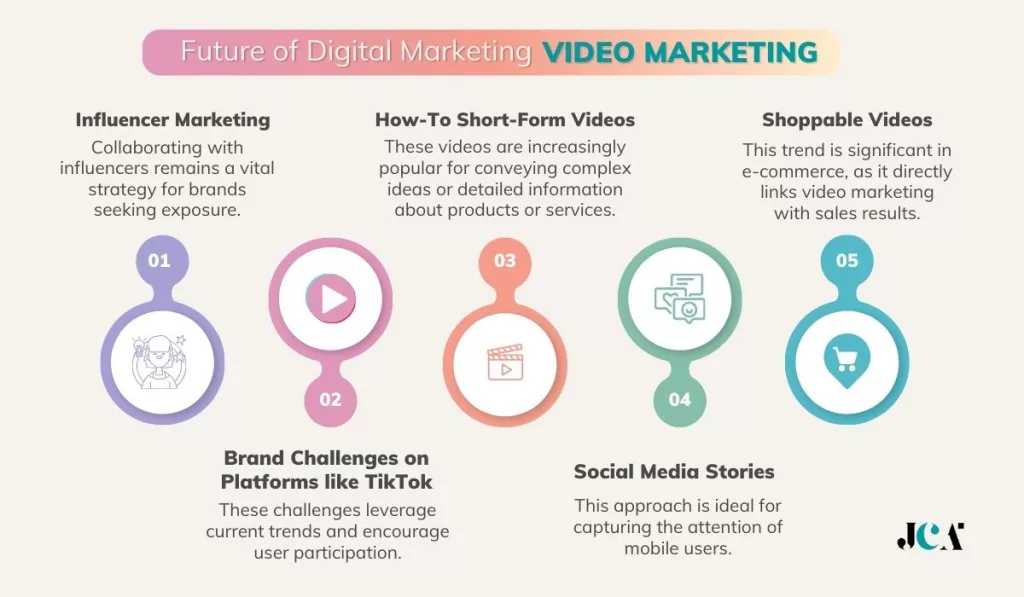
Influencer Marketing and Ads
Collaborating with influencers remains a vital strategy for brands seeking exposure. Influencers can help brands reach new audiences and their followers are more likely to try recommended products or services.
Explainer or How-To Short-Form Videos
These videos are increasingly popular for conveying complex ideas or detailed information about products or services. They are effective in influencing purchase decisions and building brand loyalty.
Brand Challenges on Platforms like TikTok
Engaging the community through branded hashtag challenges on platforms like TikTok is becoming a popular way to market. These challenges leverage current trends and encourage user participation.
Utilization of Social Media Stories
Platforms like Instagram, Facebook, and Snapchat are being used to post short, vertical videos that expire after 24 hours. This approach is ideal for capturing the attention of mobile users.
Live Streaming and Interactive Videos
Live streaming is gaining momentum, especially on platforms like TikTok, Instagram, and YouTube. These interactive videos allow real-time engagement with the audience and can be repurposed for short-form content. Some brands are also exploring shoppable live streams, adding an e-commerce element to their video content.
Shoppable Videos
Shoppable videos, where viewers can purchase products directly from the video interface, are becoming more popular. This trend is especially significant in e-commerce, as it directly links video marketing with tangible sales results.
Soundless Optimization with Subtitles/Captions
With the growing trend of viewers watching videos without sound, integrating subtitles and captions has become essential. This approach makes content more accessible and can help in delivering the message effectively even without audio.
Also read: Outsourcing Marketing for Small Business: An Introductory Guide
3. Content Marketing and SEO Trends
Now it’s crucial to spotlight one of the most transformative trends: Content Marketing and SEO Trends. This trend stands as a pivotal element in shaping your digital marketing strategy.
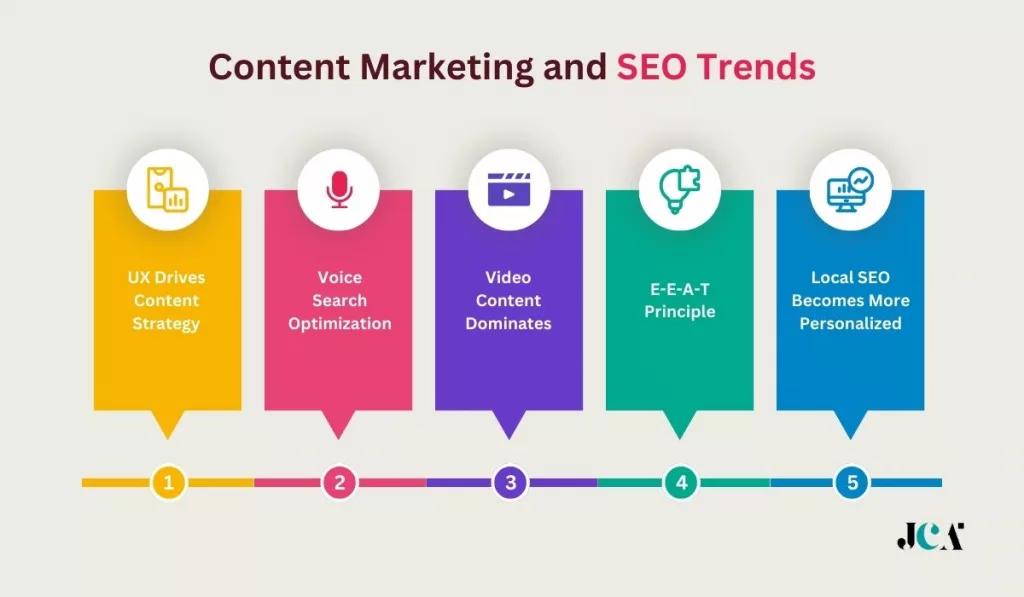
Let’s break it down:
User Experience (UX) Drives Content Strategy
Now, more than ever, it’s all about you, the user. Websites are focusing on delivering an unparalleled user experience, which means content that’s not just informative but also engaging and easy to navigate. This shift places you at the center of the content universe.
Voice Search Optimization
With the rise of smart speakers and AI assistants, your voice queries are shaping how content is optimized. It’s not just about keywords anymore; it’s about understanding and integrating natural language patterns into content.
Video Content Dominates
You’re likely to engage more with video content. This year, video content is not just an option; it’s essential. Detailed explainer videos on websites help improve SEO. Now it’s about creating content that resonates with you and holds your attention.
E-E-A-T Principle
Experience, Expertise, Authority, and Trustworthiness (E-E-A-T) are your new benchmarks for quality content. Search engines are prioritizing content that not only answers your questions but also comes from credible sources.
Local SEO Becomes More Personalized
As you search for local services or products, the content you find is becoming more localized and personalized. It’s all about providing you with the most relevant and local results.
Also read: 8 Marketing Strategies for Startups: Small Budget, Big Impact
4. Automation and Efficiency in Marketing
This trend is not just a fleeting change; it’s a significant pivot that could revolutionize your marketing strategy. Let’s delve into why this is a game-changer:
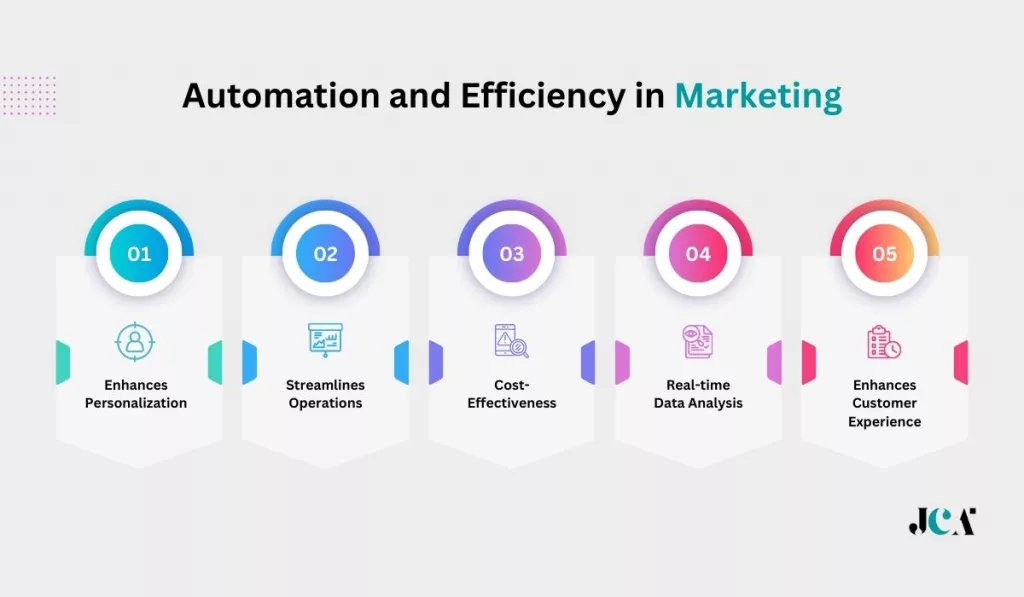
Enhances Personalization
Automation tools have become adept at analyzing vast datasets, allowing marketers to deliver highly personalized content to consumers. By understanding individual preferences and behaviors, you can tailor your messages and offers, making each customer feel uniquely valued.
Streamlines Operations
Automation simplifies numerous routine tasks. From scheduling social media posts to managing email campaigns, these tools free up your time. This means you can focus on more creative and strategic aspects of marketing, driving better results with less effort.
Cost-Effectiveness
By automating repetitive tasks, you significantly reduce labor costs. This efficiency doesn’t just save money; it also ensures consistency in your marketing efforts, leading to better brand reliability and trust.
Real-time Data Analysis
With automation, you’re not just working faster; you’re working smarter. These tools provide real-time insights, allowing you to make data-driven decisions swiftly. This agility is crucial in a digital landscape where trends and consumer behaviors change rapidly.
Enhances Customer Experience
Automation tools enable you to respond promptly to customer inquiries and feedback, enhancing their experience with your brand. A quick and personalized response can turn a potential customer into a loyal one.
Scalability
As your business grows, automation scales with you. Whether it’s expanding your email list or managing an increasing number of social media followers, these tools adapt to your growing needs, ensuring that your marketing efforts remain consistent and effective.
5. Real-Time Marketing
Real-time marketing is a type of marketing that responds to real-time events. It interacts with customers in real-time and delivers relevant content, products, or services. Real-time marketing has already become a huge trend, but we think it will only grow stronger as we move forward into 2025 and beyond. This is good news if you look at how much time people spend on social media daily!
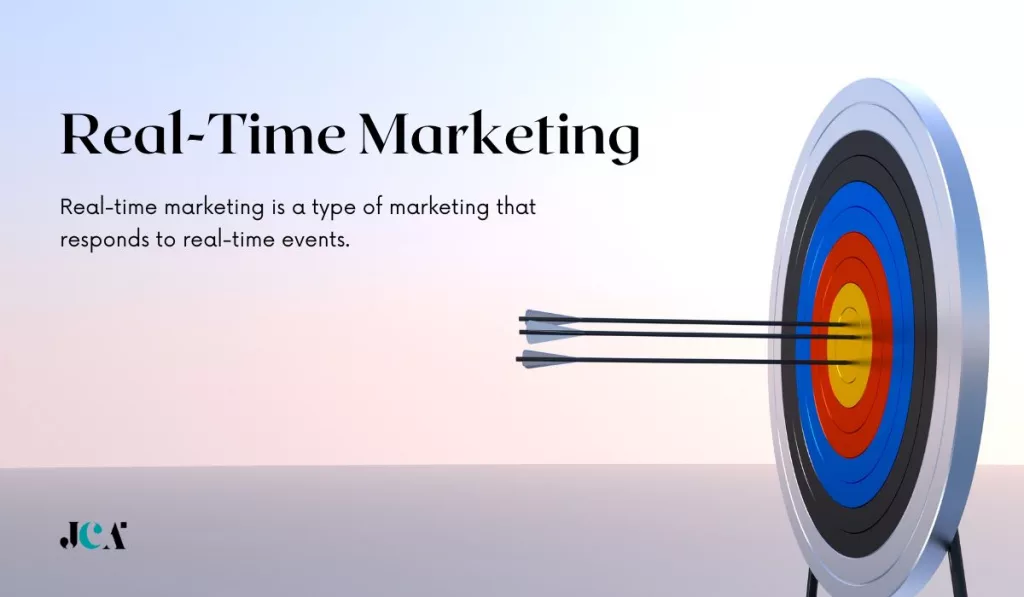
People experience real events throughout the day (like meetings, sports games, or awards shows) and often want those moments captured so they can share them with others. This means more opportunities for marketers who want their products featured in these clips! Real-time marketing can be used for different purposes: you can use it to engage with your customers, reward them for their loyalty, or increase sales by offering discounts at the right time.
It is also great as an engagement tool if you want to engage with influencers on social media or send out direct messages to followers who might be interested in buying your products.
Also read: White Labeling Is A Highly Effective Marketing Tool For Your Business
6. Shift in Consumer Behavior and Expectations
By focusing on personalization, respecting privacy, and embracing mobile-first tactics, you’re not just following a trend. You’re staying ahead of the curve, ensuring that your digital marketing strategy is not only current but also future-proof. Let’s understand how:
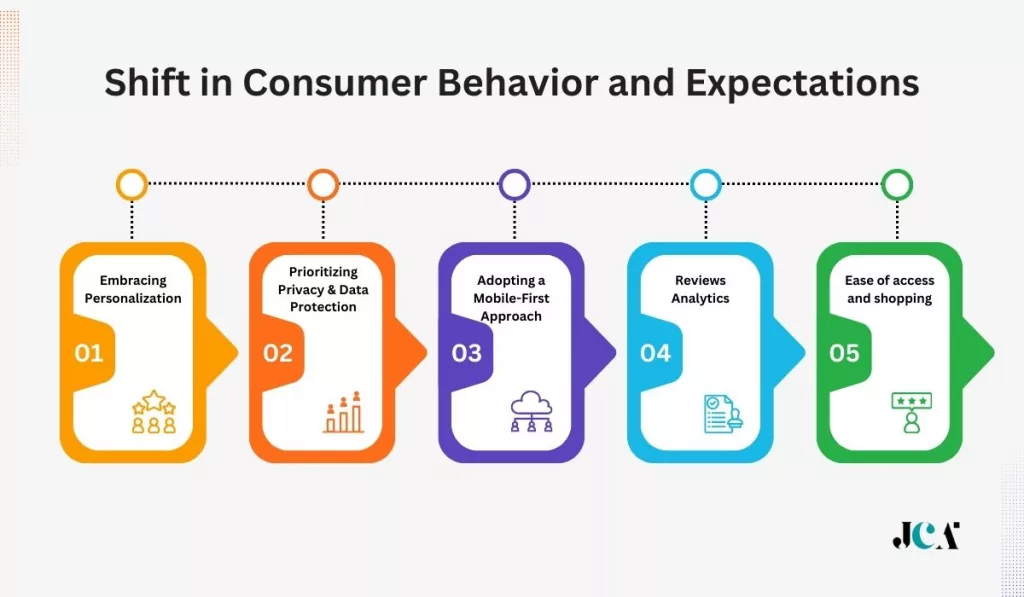
Embracing Personalization
You’ve probably noticed how consumers are increasingly seeking personalized experiences. They want content, offers, and interactions tailored specifically to their preferences and behaviors. This isn’t just a preference; it’s becoming an expectation. As a marketer, you should leverage data analytics to offer these personalized experiences. Remember, it’s about making your audience feel special and understood.
Prioritizing Privacy and Data Protection
Alongside the demand for personalization, there’s a growing concern for privacy. Consumers are more aware and cautious about how their data is used. They appreciate transparency and control over their personal information. You need to ensure that your data handling practices are not only compliant with regulations but also transparent to your audience. Building trust is crucial.
Adopting a Mobile-First Approach
The shift towards mobile-first strategies is unmistakable. With the majority of online interactions occurring on mobile devices, your digital marketing efforts must prioritize mobile compatibility. This means optimizing websites for mobile, creating mobile-friendly content, and leveraging mobile-specific channels. You’re not just reaching your audience where they are; you’re catering to their preferred mode of interaction.
7. Diverse Content Creators
Content creators come from different backgrounds, cultures, and religions. The internet has always been where we can find people who share our interests and passions – and maybe even share some of our same experiences or views on life!
The digital marketing industry is no exception to being inclusive with its content creators. We are going through an interesting time right now where there is a push toward creating more diverse representation in all facets of life: movies and television shows featuring female actors as action heroes, mixed-race groups working and playing together, professional athletes who are LGBTQ+, etc.
The digital marketing industry is not immune from this trend either – it will only become more diverse as time goes on.
8. Data Analytics and Hyper-Personalization
Data Analytics and Hyper-Personalization are revolutionizing digital marketing in 2025. Here’s why they matter:
Big Data Analysis
You’re no longer guessing. With big data, you understand your audience deeply. You’re leveraging vast amounts of data, from social media interactions to purchasing histories, to uncover patterns and preferences. This isn’t just about collecting data; it’s about interpreting it to make informed decisions.
Hyper-Personalization in Marketing Strategies
Now, you’re not just reaching out to customers; you’re connecting with them on a personal level. By integrating data analytics, you’re tailoring your marketing messages and offers to individual needs and preferences. This means your campaigns are more relevant, engaging, and effective. You’re speaking directly to each customer, addressing their specific desires and pain points.
Predictive Analytics
With this you’re staying ahead of the curve. Predictive analytics allow you to anticipate customer needs and trends, making your strategy proactive rather than reactive. You’re predicting future behavior based on past data, ensuring your marketing efforts are always one step ahead.
This trend is a game-changer because it transforms how you interact with your customers.
9. Voice Search & Conversational Commerce Takes Off
Voice-enabled shopping is no longer a novelty—it’s becoming a default habit. Smart speakers and in-app voice assistants now shorten the path from discovery to checkout, creating a “hands-free funnel” you can’t ignore. Global voice-commerce spend is projected to jump from US $116.83 billion in 2025 to US $151.39 billion in 2025 (CAGR 29.6 %)—growth that rivals early-mobile adoption rates.
Why it matters for you
- Friction-free intent capture: Voice queries often carry clear purchase intent (“Buy running shoes size 9”). Optimize for long-tail, natural-language keywords.
- Conversational SEO: Schema markup for FAQs and “speakable” content helps assistants surface your brand first.
- Voice-activated upsells: Pair product suggestions with reorder prompts (“Would you like refills?”) to lift average order value.
10. Privacy-First Marketing & Zero-Party Data
As third-party cookies crumble, the spotlight shifts to data customers volunteer. Zero-party data (ZPD) strategies—think quizzes, preference centers, and gated content—put consent and transparency at the core of personalization. Marketers that lead with ZPD are seeing higher engagement and lower churn in the cookieless transition.
Quick wins
- Value-exchange quizzes: Offer tailored recommendations in return for explicit preferences.
- Progressive profiling: Capture small data points over time instead of asking for 20 fields at once.
- Privacy UX: Display clear data-use messaging and let users edit or delete their info anytime—trust builds loyalty.
11. Sustainability & Ethical Storytelling Drive Purchase Intent
Consumers increasingly vote with their wallets: PwC’s 2025 Voice of the Consumer Survey shows shoppers will pay 9.7 % more for sustainably sourced goods. Ethical positioning isn’t greenwashing hype; it’s an ROI-positive differentiator.
Make it tangible
- Lifecycle transparency: Share sourcing maps, carbon-offset data, and end-of-life recycling guides.
- Purpose-driven content: Weave sustainability milestones into your brand narrative across reels, blogs, and product pages.
- Measure & iterate: Track eco-KPIs (emissions saved, recycled materials) and feature them in dashboards customers can see.
12. Social Commerce & In-App Checkout Eclipse Traditional Funnels
Social networks are morphing into full-funnel storefronts. In the U.S. alone, social-commerce sales are forecast to hit US $71.62 billion in 2025, with TikTok Shop converting more than 40 % of its users into buyers.
Your playbook
- Shoppable videos & livestreams: Tag products directly in reels and live sessions to shrink the gap between inspiration and purchase.
- Creator-led storefronts: Co-host in-app “drops” with influencers for instant reach and trust transfer.
- Native loyalty programs: Reward purchases made inside the platform to keep shoppers in the ecosystem (and in your funnel).
13. Augmented Reality (AR) & Virtual Try-Ons Become Table Stakes
Scrolling is passive; AR is participatory. In 2025, retailers report that 55 % of all AR use cases are in commerce, and the wider AR/VR market is already worth US $32.1 billion—with revenue set to hit US $58.1 billion by 2028.
- 3-D product previews: Let shoppers rotate, scale, and place items in their space before buying, cutting returns.
- Virtual try-ons for fashion & beauty: Boost confidence and conversion—AR try-ons have shown up to a 40 % conversion lift for some retailers.
- AR SEO: Optimize alt text and 3-D model metadata so search engines and social lenses can index your immersive assets.
Final Words
Now that you know what the future of digital marketing holds, it is time to start. Remember that video is your most powerful tool in this new world, and use it wisely. To stay ahead of the curve in 2025, you must implement all these trends into your digital marketing strategy. It does not take much effort to create a basic video.
Still, there are many creative ways to take advantage of all types of content, including text, images, audio, and video. The key here is to do something different than everyone else who thinks they have something special to say, but only if they can tell their story well enough through these different mediums!










Leave a Reply